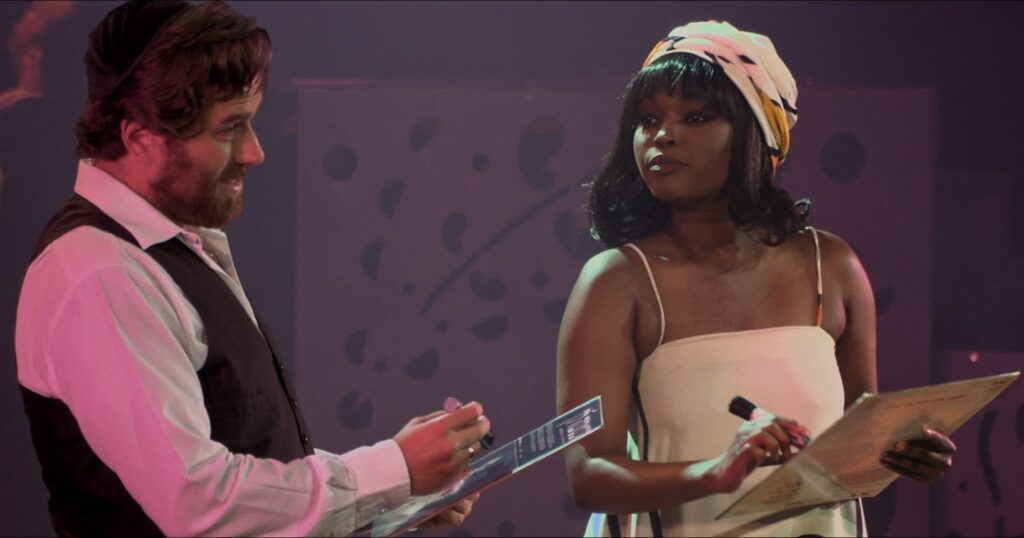
By Donald H. Harrison

SAN DIEGO — Soul Doctor: Journey of a Rockstar Rabbi is a filmed stage show about the friendship and mutual support between Rabbi Shlomo Carlebach and African-American singer Nina Simone.
Starring Josh Young as Carlebach and Nya as Simone, the musical will be shown in more than 600 theatres across the country at 7 p.m. Tuesday, June 13, including selected AMC’s and Regal Theatres in San Diego County.
The film begins with Carlebach in a dispute with his father, who is a former chief rabbi of Vienna, over whether he should perform so many years later in the city from which they were forced to flee by the hated Nazis. It then goes into a biographical flashback.
The story will remind some viewers of The Jazz Singer and My Name is Asher Lev because one of its important elements was Carlebach’s determination to pursue his art even if it meant breaking some of the ritualistic bonds of Orthodox Judaism. He believed actualizing through song a message of “peace and love” was the essence of the Judaism that he had learned from his father Rabbi Naftali Carlebach (Mark Zell).
Rabbi Naftali Carlebach saw his mission as transplanting Orthodox Judaism to the United States to build anew what Hitler and his henchmen had destroyed in Europe. For the older Carlebach, that meant preserving every stricture of Orthodox Judaism. Despite his insistence on Jewish ritual, which in some cases leads to separation from the surrounding non-Jewish society, the elder Carlebach was an advocate for civil rights and an enemy of bigotry. When a cantor referred contemptuously in Yiddish to African-Americans, the elder Carlebach banished him from his synagogue.
Wanting to learn how music can motivate people, the younger Carlebach wandered into a nightclub where Nina Simone was singing at her piano. Entranced, he stayed to talk with her. She noted that much of her music was informed by the pain she and other African-Americans had experienced over the centuries. “I know,” sighed Carlebach, prompting Simone to ask angrily how he or any White person could “know.” He told her what had happened to his family, friends, and relatives in Austria under Hitler.
“How do you people go on?” Carlebach at one point asked Simone.
“We sing,” she responded.
The two artists bonded in their mutual determination to forge lasting music in transcendence of tragedy. In a duet, they sang Ki Va Moed {The Time Has Come) which became the theme song of the production and their mutually supportive professional relationship.
As Carlebach developed his music, he ran afoul of the traditional members of his father’s synagogue. In one scene, a bar mitzvah boy named Joel sang an upbeat song of Carlebach’s composition and was chased from the bima by the old-school cantor. Joel vowed never to come back, but eventually he did.
In Greenwich Village, Carlebach’s songs of love and hope soothed Ruth Mandelbaum (Emily Padgett), a lost soul who had sought one last fix before committing suicide. She became a camp follower, but she nearly reverted to self-destruction after Carlebach recoiled from a hug. This was not a rejection of Ruth personally, but rather the instinctive reaction of an Orthodox Jew who had been taught since childhood that unmarried men and women must not touch. Understanding how refusal to touch can be taken as an insult by non-Orthodox women, Carlebach decided in another move away from strict Orthodoxy to touch and be touched as, for example, shaking hands, or putting arms around shoulders while dancing.
A breakthrough in Carlebach’s singing career came when music producer Milt Okun (Marvin Meital) heard him and offered to produce a record, which he did in a very funny scene in which Carlebach swayed while he sang as a record company assistant tried frantically to keep the microphone in front of him.
With his new found fame and celebrity, Carlebach moved to San Francisco to the famed hippie corner of Haight and Ashbury where he founded a synagogue of prayer and peace. As Carlebach’s reputation built, his father came to understand that although Carlebach was unorthodox, his outreach brought many more Jews to the fold.
Following the stage production, footage is shown of the real Carlebach and Simone.
*
Donald H. Harrison is editor emeritus of San Diego Jewish World. He may be contacted via donald.harrison@sdjewishworld.com